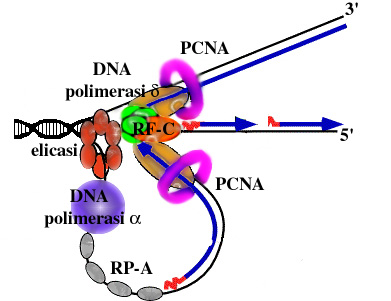The survival of organisms depends on the accurate transmission of the genetic information from one cell to its daughters through a metabolic pathway called DNA replication. DNA replication occurs in vivo in an ordered and highly organized way to satisfy three main tasks:
1) DNA replication must occur in a specific moment of the cell cycle called S phase or synthesis phase
2) each DNA sequence must be duplicated once per cell cycle
3) the genetic information (determined by the nucleotide sequence) must be copied in a high-fidelity way. In human cells DNA replication takes place at discrete sites within the cell nucleus referred to as replication factories.
Replication factories assemble during S-phase and contain the factors required for DNA synthesis along with the newly synthesised DNA. The faithful organization of the activities inside each factory is essential to cell cycle progression and cell proliferation. The main distinguishing feature of the oncogenic transformation is the acquired ability of cancer cells to undergo unrestrained cell division. Therefore the study of DNA replication is fundamental both to understand the molecular basis of tumorigenesis and to identify new targets for anticancer drugs. Moreover the study the replicative enzymes allows the design of new antiviral drugs able to inhibit selectively the replication of viral DNA. The Istituto di Genetica Molecolare di Pavia is actively involved in the study of DNA replication and in collaborative programs with:
University of Texas, San Antonio, USA; Upjohn-Pharmacia, Nervino, Italy; University of Zürich, Switzerland; IFREMER-Brest, France; CNRS, France.
The studies performed in Pavia allowed:
- to identify a signal for the recruitment of replicative enzymes to the replication factories. The use of this signal to target inhibitors of DNA replication to the replication factories is under investigation.
- To identify a circuit that directs the disassembly of replication factories in response to DNA damage or chemotherapeutic drugs. This result improved our knowledge of the mechanism of action of the anticancer drug etoposide.
- By characterizing the mechanisms of DNA replication of viral genomes, to identify new targets for antiviral therapy and to validate the antiviral activity of new drugs directed against HIV and hepatitis C viruses.
These results represent major advances in our understanding of molecular and cellular mechanisms involved in cell proliferation and virus propagation. The knowledge of the molecular and cellular biology of healthy cells is essential to understand pathological degeneration and to set up defensive strategies.
The work at IGM-CNR of Pavia was supported by grants of European Union and AIRC.
Immagini:


